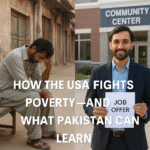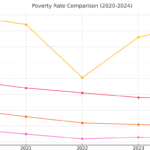I recently watched a powerful episode of the Raftar Now podcast titled: “How Seth Culture is Destroying Talent in Pakistan.” And I couldn’t help but compare it with how things work here in the United States.
Let’s break it down — and maybe we’ll see where the problem really lies.
What Is Seth Culture, Anyway?
If you’ve ever worked in Pakistan, you probably already know this.
“Seth culture” means the office is run like a personal kingdom, usually by the owner himself or his family. Or you are in a government job. The vibe?
“You’re lucky to even have this job. Now obey.”
There’s no real system — just orders from the top. No proper HR. No modern management. No room for ideas. And definitely no questioning the boss.
That’s why so many talented young people feel stuck, unheard, and mentally exhausted.
Why Offices Feel Like Prisons
In the video, the speakers talk about how:
- Micromanagement kills creativity
- Rigid hierarchies stop innovation
- Employees are treated more like robots than real people
- Growth doesn’t come from merit, but from favoritism
Doesn’t this sound familiar?
I’ve seen people in Pakistan wake up every morning dreading the workday. There’s no spark. No motivation. Just survival.
That’s Why the Talent Leaves
Now here’s the sad part — many smart, driven people simply leave the country.
They either go abroad or start freelancing from home to escape this toxic office culture.
This isn’t just “brain drain.” It’s talent suffocation.
Let me share something personal.
In the company where I worked abroad, there was an opening for a Director Corporate position. A Pakistani applied. He was more qualified than anyone else in the race — but still, he was not selected.
Why? No one said it out loud, but we all knew — it was because he was from Pakistan.
Just two or three weeks later, we got an official HR email.
That same Pakistani candidate had been hired — not for the Director role — but for something even higher:
EVP Corporate — directly from Pakistan.
Think about that.
The same guy wasn’t trusted locally — but was hired directly from Pakistan at a higher level. Why? Because he was recognized officially, not just “seen” casually.
That’s what happens when there’s no system to recognize or promote real talent — it gets overlooked, underused, or simply lost to other channels.
This kind of thing makes you wonder:
How many people are out there right now with amazing potential — but no platform to grow on?
When systems are broken, even the most talented people slip through the cracks.
What the U.S. (and Abroad) Does Differently
Let me share a real story I came across while studying in America.
A Pakistani student I knew met the son of the Dornier Aircraft Company owner — a respected name in aviation.
But instead of jumping straight into his father’s business, the Dornier heir had a different plan:
Work at Boeing for at least five years before even thinking about taking a leadership role in his family’s company.
Why?
Because he believed in earning credibility and experience first — legacy second.
Here in the States, I‘ve worked both corporate and retail. And from my own experience, I can honestly say — working here compared to Pakistan is like night and day.
Teamwork is encouraged in the U.S. New ideas are welcomed. There‘s a focus on transparency, effective and clear communication, honesty, integrity and above all, a good work-life balance.
And it’s not just in the workplace — the same mindset runs through the entire country.
America demands that its citizens obey the laws and work honestly. And in return, the system provides all that a person needs to live with dignity, no matter what religion, color, or origin.
Now compare that to Pakistan, where most business heirs are handed over the top seat like it’s a birthright. No outside exposure. No real struggle. And sadly, no empathy for employees.
This mindset often leads to the same toxic culture: dictatorship in the office, resistance to change, and zero growth.
What that Dornier guy said stuck with me — and the podcast nailed it:
This is exactly what Pakistan needs to transform its legacy businesses.
It’s Not Just Business — Pakistan’s Politics Has the Same Seth Culture
The sad reality is — our politics is no different.
Just like Pakistani businesses are stuck in the Seth culture, our politics is also trapped in the same outdated, dynastic mindset.
Here’s the pattern:
If you’re born into a ruling family or a famous political party, then you’re automatically a leader — even if you’ve never faced a real challenge, never lived in poverty, and never stood in line to buy daily groceries.
Can someone who never stepped into a public hospital fix our healthcare system?
Can a politician’s son — who’s never lived without generators, bodyguards, or privilege — truly understand the pain of a common man?
We keep expecting these rich, disconnected sons of powerful leaders to solve poverty, without realizing they’ve never even seen poverty up close.
They don’t know the price of daal, the load-shedding in small towns, or what it feels like to live paycheck to paycheck.
Leadership in Pakistan has become about birthright, not experience.
That’s the exact same disease we see in business.
It’s the “I own it, so I lead it” mindset — regardless of skill, knowledge, or merit.
And that’s why nothing changes.
If we want real reform in our economy and our government, we need to break this Seth cycle, bring in people with ground reality exposure, and create space for those who’ve earned their way up.
What Pakistan Can Learn
If we want progress, we have to move away from this Seth mindset.
Here’s what can help:
- Replace micromanagement with trust
- Promote on merit, not relationships
- Create room for feedback and ideas
- Encourage leaders to get real training and outside experience, even in other companies first.
It’s not about copying the West blindly. It’s about learning from systems that actually produce results, and adjusting them to our culture.
💬 Final Thought
The reason our youth are frustrated isn’t that they’re lazy. It’s that the system keeps killing their potential before it even grows.
We can do better. We must.
If we want to build a better Pakistan, we have to stop treating people like servants and start trusting them like partners.
Just like I’ve seen here in the United States — and just like that Dornier story reminds us:
Respect is earned. Leadership is not inherited — it’s built.










